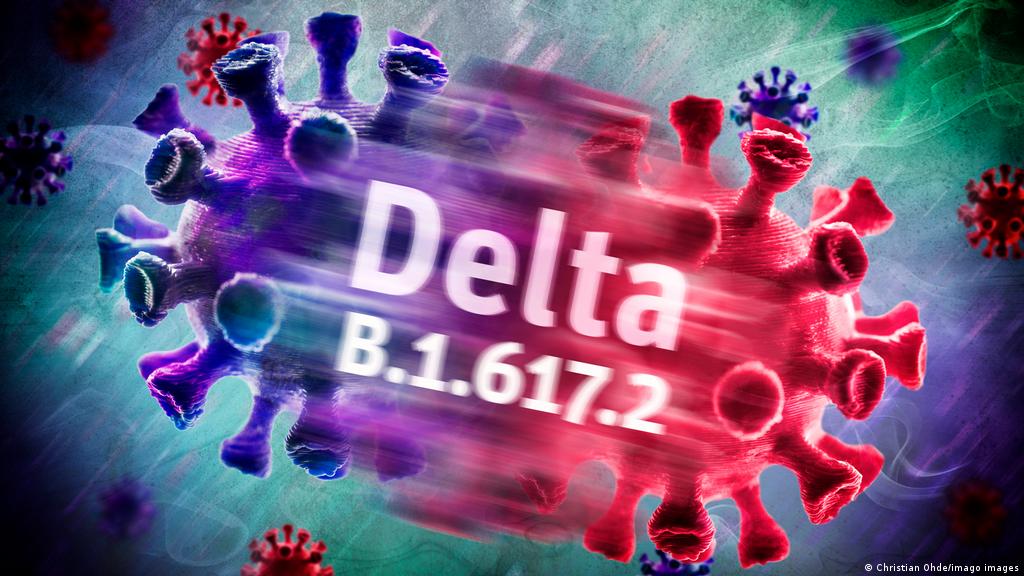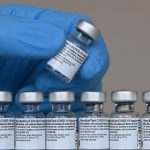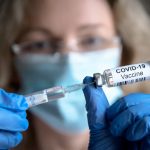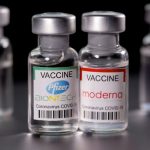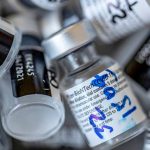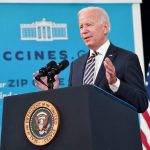Centers for Disease Control and Prevention
Vaccine
Last week the Centers for Disease Control announced new mask guidance, recommending vaccinated people mask up inside. This comes as the Delta variant, which first emerged last year in India, becomes the dominant strain of Covid-19 in Arizona and the United States.
The delta variant is definitely a game changer for the vaccinated and the unvaccinated.
“Infections overall have been increasing . And we know that breakthrough infections are bound to occur even with highly effective vaccines out there. so we are seeing and hearing of more examples of breakthrough infections,” said epidemiologist Dr. Kate Ellingson, an assistant professor with the University of Arizona’s College of Public Health.
For many vaccinated Americans, the pandemic was over. Most mask restrictions had been lifted and people were returning to pre-pandemic life. But the Delta strain is causing a pandemic whiplash. “Delta is so much easier to catch because it the virus just spreads out in the air so easily and the virus latches onto your cells inside your body more quickly which makes it more likely a person can become infected,” said Will Humble, Executive Director of the Arizona Public Health Association.
Many studies are looking at just how much Delta is turning the pandemic on its head. The viral load is 1000 times higher in people infected with Delta than previous strains, according to one Chinese study.
Researchers say the incubation period is also shorter, four days in Delta compared to six in the original strain. And another study found mutations in the spike protein which could help it dodge the immune response. Ellingson said this highly transmissible Delta variant, coupled with a society that is returning to normal but not yet fully vaccinated is behind the increase we are now seeing in covid cases.
Infections have increased in Arizona over the past six weeks. The Pima County Health Department said 522 breakthrough infections have been reported since July 19th. There were 17 hospitalizations and two deaths. This is out of 544,962 fully vaccinated people.
Researchers are trying to determine *who is at a greater risk for breakthrough infections. “We don’t know entirely why some people have break through infections and some don’t,” said Dr. Jeff Burgess, Professor and Associate Dean for Research at the Mel and Enid Zuckerman College for Public Health at the U of A. “But we’re seeing breakthrough infections in other individuals that don’t clearly have immune suppression,” he said.
Burgess is also leading studies with AZ Heroes. It’s a two-year research project funded by the Centers for Disease Control and Prevention. Researchers are now enrolling kids, ages four months to 17 years in the AZ Heroes Kids Study. Researchers will look at SARS-CoV-2 infection in children and teenagers and how well the COVID-19 vaccine protects from infection.
While this new wave comes as Arizona had thought it was leaving the pandemic behind, health experts say vaccines still offer a high level of protection against severe illness and death, even with the Delta variant. ” If you are fully vaccinated and you get the illness you are 700% less likely to need to be hospitalized, 2000% less likely to die,” Humble said.
About 99.999% of fully vaccinated Americans have not had a deadly Covid-19 breakthrough case, CDC data shows
More than 99.99% of people fully vaccinated against Covid-19 have not had a breakthrough case resulting in hospitalization or death, according to the latest data from the US Centers for Disease Control and Prevention.
The data highlights what leading health experts across the country have highlighted for months: Covid-19 vaccines are very effective at preventing serious illness and death from Covid-19 and are the country’s best shot at slowing the pandemic down and avoiding further suffering.
The CDC reported 6,587 Covid-19 breakthrough cases as of July 26, including 6,239 hospitalizations and 1,263 deaths. At that time, more than 163 million people in the United States were fully vaccinated against Covid-19.
Divide those severe breakthrough cases by the total fully vaccinated population for the result: less than 0.004% of fully vaccinated people had a breakthrough case that led to hospitalization and less than 0.001% of fully vaccinated people died from a breakthrough Covid-19 case.
Most of the breakthrough cases — about 74% — occurred among adults 65 or older.
Since May, the CDC has focused on investigating only hospitalized or fatal Covid-19 cases among people who have been fully vaccinated. The agency says the data relies on “passive and voluntary reporting” and is a “snapshot” to “help identify patterns and look for signals among vaccine breakthrough cases.”
“To date, no unexpected patterns have been identified in the case demographics or vaccine characteristics among people with reported vaccine breakthrough infections,” according to the CDC.
The agency shared a study this week that showed the Delta variant produced similar amounts of virus in vaccinated and unvaccinated people if they get infected. Experts continue to say that vaccination makes it less likely you’ll catch Covid-19 in the first place. But for those who do, the findings suggest they could have a similar tendency to spread it as unvaccinated people.
That study also convinced CDC leaders to update the agency’s mask guidance on Tuesday, recommending that fully vaccinated people also wear masks indoors when in areas with “substantial” and “high” Covid-19 transmission to prevent further spread of the Delta variant. Guidance for unvaccinated people remains to continue masking until they are fully vaccinated.
“To date, no unexpected patterns have been identified in the case demographics or vaccine characteristics among people with reported vaccine breakthrough infections,” according to the CDC.
The agency shared a study this week that showed the Delta variant produced similar amounts of virus in vaccinated and unvaccinated people if they get infected. Experts continue to say that vaccination makes it less likely you’ll catch Covid-19 in the first place. But for those who do, the findings suggest they could have a similar tendency to spread it as unvaccinated people.
That study also convinced CDC leaders to update the agency’s mask guidance on Tuesday, recommending that fully vaccinated people also wear masks indoors when in areas with “substantial” and “high” Covid-19 transmission to prevent further spread of the Delta variant. Guidance for unvaccinated people remains to continue masking until they are fully vaccinated.
Pace of vaccinations is going up
Health care workers assist a patient in the ICU inside Little Company of Mary Medical Center on July 30, 2021 in Torrance, California
But experts say those vaccinated, while they may be able to transmit the virus, remain very well protected against getting seriously ill. Amid the latest surge of Covid-19 cases nationwide fueled by the Delta variant, local leaders across the US are reporting that the majority of new infections and hospitalizations are among unvaccinated people.
The Delta variant is now so contagious, one former health official recently warned that people who are not protected — either through vaccination or previous infection — will likely get it.
Amid concerns over the rising cases and the dangerous strain, the country has seen a steady rise in the pace of vaccinations in the past three weeks — and an even sharper increase in states that had been lagging the most, according to a CNN analysis of CDC data.
The seven-day average of new doses administered in the US is now 652,084, up 26% from three weeks ago.
The difference is even more striking in several southern states: Alabama’s seven-day average of new doses administered is more than double what it was three weeks ago. The state has the lowest rate of its total population fully vaccinated in the US, at roughly 34%.
Arkansas, with just 36% of its population fully vaccinated, has also seen its average daily rate of doses administered double in the last three weeks.
Louisiana, which had by far the most new Covid-19 cases per capita last week and has only fully vaccinated 37% of its population, saw daily vaccination rates rise 111% compared to three weeks ago.
Meanwhile, Missouri, which has been among the hardest-hit states in the latest Covid-19 surge, now has a daily average of new vaccinations 87% higher than three weeks ago.
Roughly 57.5% of the US population has received at least one Covid-19 vaccine dose and about 49.5% is fully vaccinated, CDC data shows.
DOH agrees with US CDC report calling Delta variant as contagious as chickenpox
The Department of Health agrees with a US agency’s report saying the Delta variant appears to spread as easily as chickenpox.
The report by the US Centers for Disease Control and Prevention (CDC) said the Delta variant’s transmissibility is comparable to chickenpox since a person infected with it can also infect up to eight others in one sitting.
“With this kind of analysis, yes we agree to that, and nasa ebidensya naman po talaga na ang Delta variant po [and evidence really shows the Delta variant] is highly transmissible compared to the UK variant na nakakainfect lang ng hanggang apat [which can infect just four] to five persons,” DOH Undersecretary Rosario Vergeire said.
The CDC report said the Delta variant also appears to cause more severe illness.
It added that fully vaccinated people can spread the Delta variant in the same rate as people who have not been immunized against COVID-19.
The country has so far confirmed over 200 Delta variant cases in the past two weeks, with 17 currently active.
OCTA Research Group said last weekend the Philippines is “flying blind” on the actual number of Delta variant cases due to limited sequencing capacity.
The DOH, however, said the main purpose of genome sequencing is to detect variants of concern and if these variants are causing severe illness among those who get infected.
“As to the extent at kung sinu-sino sa buong bansa ang merong Delta variant [As to the extent and who have been infected with the Delta variant nationwide], we are way past that when it comes to management. We are now assuming that there are really a lot of Delta variant (cases) already and we are doing response dyan sa direksyon na ‘yan [in that direction],” Vergeire explained.
She added that the Philippine Genome Center is doing well as it has one of the highest outputs compared to other Southeast Asian countries.
‘There’s No Silver Bullet’: What Polling Trends Reveal About Vaccine Hesitancy
Vaccine hesitancy and refusal has remained an obstacle for the U.S. effort to end the pandemic since before COVID vaccines were even rolled out. While coronavirus experts and public-health officials had repeatedly warned about the unnecessary consequences of waiting to get vaccinated, the arrival and rapid spread of the transmissible Delta variant has quickly brought that painful lesson home and prompted even louder pleas for America’s millions of unvaccinated residents to get their shots in arms. Intelligencer spoke with Mollyann Brodie, executive director of the Kaiser Family Foundation’s Public Opinion and Survey Research, to learn about shifting trends in Americans’ willingness to get vaccinated and what it will take for vaccine holdouts to get off the fence.
According to the Kaiser Family Foundation’s profile on the unvaccinated, there are strong partisan differences when it comes to willingness to get a vaccine. How real is this partisan split?
The pandemic started in a very politicalized environment, and that politicalization held through as we moved into the vaccination stage of the pandemic. Political party ID has been a good predictor of where people stand in terms of vaccination, but it’s not the only thing that matters. If you look at any particular demographic group within America, no group is monolithic in its intentions. If I look at groups in America by age, race, party ID, gender, or by insurance status, across all of those groups, there will be a large share who are already vaccinated, there’ll be a share who’s still trying to come to a decision about getting vaccinated, there’ll be a share who says they only want to get vaccinated if they’re required to do so, and there’s a share who says they definitely don’t want to get vaccinated.
Now, those shares vary a little bit by those different demographic categories. If I talk about some groups that are disproportionately represented in the unvaccinated group — like those who self-identify as Republicans, or like those who are young — the majority of those groups are already vaccinated.
Among those who are still unvaccinated, they do tend to fall into two categories. About a third of those who are unvaccinated, which translates to about 10 percent of Americans overall, are people who are still really worried about getting COVID and have a lot of confusion about the vaccines. They’re concerned that the vaccines might be unsafe and that we don’t know enough about the long-term effects. This group of people tends to be more divided politically; about four in ten of the group say they’re Democrats, and about half the group say that they’re Republicans.
The other category makes up about two-thirds of the unvaccinated; that translates to about two in ten of adults nationwide. That group tells us that they definitely aren’t going to get the vaccine, or they’ll only get it if they’re required. That group of people is disproportionately white, with seven in ten of that group being white adults. And that group of people is disproportionately made up of people who self-identify as Republican. Only 12 percent of that group says they’re a Democrat. This group of people, attitudinal-wise, are much less likely to be worried that they would get sick from COVID-19 and they’re more likely to believe that the risks from the vaccine outweigh the risks from getting COVID.
These are basically the COVID vaccine holdouts. Who are the people in this category and what would it take to get shots in their arms?
We’ve talked a lot about what their demographic characteristics are, and I think that in terms of what might still motivate them, again, you have to think about them in two different groups. The group that is sitting on the fence about getting a vaccine are people who really are most likely to be impacted by conversations with physicians or other health-care providers who can really help explain the details of the vaccine and get their questions answered. There are also people in that group that will be more likely to get vaccinated if some of the access barriers can be alleviated. For the other group — the group who’s really been very clear that they don’t have any intention of getting vaccinated — it’s a little bit harder to know what the motivators will be. From our research, we’ve found that their friends and family can be very influential on them. Lastly, there’s a share in that group who, if they’re required to get vaccinated for school, for returning to employment, or for being able to do the kinds of activities they want to do in their lives, might impact their decision.
Still, there’s no silver bullet. There’s going to be different approaches that are going to work for different individuals who have different concerns and worries.
Many employers are now edging closer to requiring employees be vaccinated. What role could that have on shifting these holdouts?
Certainly, there are some people in these holdout groups who say that would matter to them, particularly those who are sitting on the fence. Six percent of adults overall told us explicitly that they would get vaccinated if they’re required to, so you’re really talking about somewhere between 5 to 10 percent of adults nationwide being open to getting vaccinated if they are required to, to return to work, or to return to their activities. But for some people, a vaccine mandate is going to be off-putting, and that’s a trade-off that we’ll have to watch going forward.
What other broad trends have you observed in your polling?
I think it’s also important to recognize that a lot of the people who remain unvaccinated have a lot of misconceptions and hold misinformation about the vaccine. About two-thirds of the unvaccinated hold at least one of five misperceptions about the vaccine, including things like you might get COVID-19 itself from the vaccine, or that the vaccine might change your DNA. There are a lot of myths out there; for the people who are still holdouts, getting their questions answered by a trusted source could really make a difference.
What role could the spread of the Delta variant have on people’s willingness to get a vaccine?
It’s a little too early to tell what the rise of Delta will mean. The early data suggested that the people who were most worried about Delta were those who were vaccinated, and those who are unvaccinated tended to not be as worried about Delta. But again, that was very, very early on as Delta came on the scene, so I think we’re going to be learning more about the potential influence of the Delta variant on vaccination rates in the next couple weeks. I expect that the advent of the Delta variant will be more of a motivator on the group that’s in the “wait and see” category, or the “only if required” group, than it will be on the “definitely not” group. Those who say they will definitely not get the shot have not felt at risk of COVID. And the question will be, is there something different about the Delta variant that makes them feel that they’re at personal risk at that point?
U.S. events led to massive COVID-19 outbreak – mostly among fully vaccinated
A new study by the U.S. Centers for Disease Control and Prevention showed that three-quarters of individuals who became infected with COVID-19 at public events in a Massachusetts county had been fully vaccinated.
The study, published on Friday, suggested the Delta variant of the virus was highly contagious. The outbreak occurred in Provincetown on Cape Cod, according to Barnstable County health authorities.
The CDC study found vaccinated individuals had a similar amount of virus presence as the unvaccinated, suggesting that, unlike with other variants, vaccinated people infected with the Delta variant could transmit the virus, the CDC said.
CDC Director Rochelle Walensky said this was a “pivotal discovery” leading to CDC’s recommendation this week that masks be worn in areas where cases were surging as a precaution against possible transmission by fully vaccinated people.
“The masking recommendation was updated to ensure the vaccinated public would not unknowingly transmit virus to others, including their unvaccinated or immunocompromised loved ones,” Walensky said.
The CDC said 469 cases were found among Massachusetts residents from July 3 to 26 related to the Cape Code outbreak. Of those, 74% were among fully vaccinated people. The CDC said its study excluded residents of 22 other states. Barnstable County reported that as of July 30, 934 total cases had been associated with the outbreak.
The CDC said that overall, 79% of the vaccinated individuals who were infected with COVID-19 also reported symptoms such as cough, headache, sore throat and fever. Four had to be hospitalized, the CDC said.
Vaccinated individuals had received one of the three available shots made by Pfizer Inc and BioNTech , Moderna Inc or Johnson & Johnson, the data showed.
The study’s authors recommended local health authorities consider requiring masks in indoor public settings regardless of vaccination status or the number of cases in the community.
The CDC said that people with COVID-19 reported having been at densely packed indoor and outdoor events including bars, restaurants, guest houses and rental homes.
